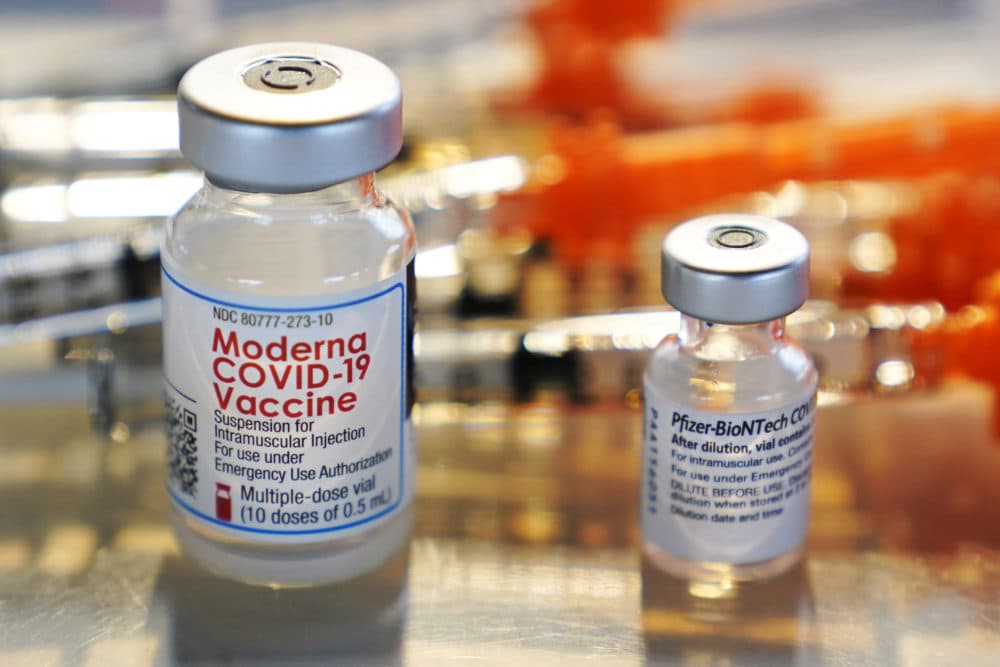Advertisement
COVID reinfections, emerging variants: Your pandemic questions, answered
Resume
From vaccinating children under 5, to emerging variants, there’s so much news around COVID-19.
“Think of this again – influenza – every year you can have the flu, right? And it may be a different strain. This is exactly the same," Dr. Jen Ashton said on Good Morning America.
What does it all add up to?
"I think ... what’s going to happen with SARS-CoV-2 is I think it’s going to become the fifth seasonal coronavirus," Dr. H. Cody Meissner says.
Today, On Point: What we now know about COVID-19.
Guests
Akiko Iwasaki, professor of immunobiology and molecular, cellular, and developmental biology at Yale University. Co-Lead investigator of the Yale COVID-19 Recovery Study. (@VirusesImmunity)
Dr. H. Cody Meissner, pediatric infectious diseases expert at Tufts Medical Center. Member on the FDA’s Vaccines and Related Biological Products Advisory Committee.
Interview Highlights
Is COVID here to stay?
Dr. H. Cody Meissner: I think there will be SARS-CoV-2, or the cause of COVID-19, will be around for the foreseeable future. I think that this is a coronavirus that's very capable of eluding our immunity, and I think it will become increasingly persistent. Although my thoughts are that this will become less and less virulent, and it will become more contagious, and it will probably develop a seasonal pattern as other coronaviruses do.
So far, it seems that we've learned that the youngest children have not been the biggest spreaders of COVID-19. Why is it so important for children to get this vaccine?
Dr. H. Cody Meissner: It's important to recognize that this is an 18 month anniversary of the availability of messenger RNA's, they first became available in the middle of December 2020. And these are absolutely remarkable vaccines that are amazingly safe and effective. And everyone, every adult, should avail herself or himself of this vaccine now. The issue is that this virus is going to continue to mutate.
All viruses, particularly the so-called RNA viruses, mutate. And they become less sensitive to the immune response that we have built up, either from the vaccine or from previous infections. And I think this is what's going to transpire. ... There will be minor mutations that will continue to occur, and we may have to tweak the vaccines in order to provide optimal protection. But we don't know that yet, I think. And we may get into this in a little bit. But right now, the vaccines that we have appear to be quite effective at preventing illness in adults and in children.
I want to talk about reinfections. They seemed very rare in the first year of this pandemic, but now they seem to be becoming increasingly more common, even in people who are vaccinated. Why is that happening?
Dr. H. Cody Meissner: Initially, we thought the vaccines were very effective at preventing infections. And when both Pfizer and Moderna conducted their initial trials of very large numbers, more than 30,000 to 40,000 subjects who were randomized, it looked as though, at least for the first few months, people did not get infected after the second dose of the messenger RNA vaccines. But as time has gone by, we've come to realize that, in fact, part of the immune response to the vaccine wanes. And that part is what we talk about as antibodies. And those antibodies seem to decline below a level that will protect a person from becoming infected. They will still prevent a person from getting sick. And having to go to the hospital in most cases.
And that's probably because of another part of the immune response, the so called T-cell immune response that probably persists. And that's what continues to protect people from severe disease. But as time goes by, there is waning immunity in terms of the antibodies. There are also mutations that occur in the virus, making them less sensitive to the antibodies that were made after the infection or the vaccine. And so they still can become infected and they can still spread the virus to people around them who are susceptible to the infection.
And I think we've learned this most recently from Dr. Tony Fauci, who had his primary series. Then, my understanding is he had two boosters, and yet he still became infected. He wasn't very sick, but he was still worried about transmitting the virus to the president and to others. And so he appropriately isolated himself. But I think we're learning that this is likely what's going to happen as we move forward into this pandemic next.
What should our listeners be doing to best protect themselves given that there are continued risks, like long COVID?
Dr. H. Cody Meissner: We all need to think differently about risk. Risk is something that we encounter every day, when you get in a car and drive to work. You're accepting the risk that you could get into an automobile accident. And I think we have to understand that the risk of SARS-CoV-2 is unlikely to go away. And. We have to learn to accept the fact that in the vast majority of people, because the CDC now tells us that 95%, based on their surveys from commercial laboratories, have immunity, have antibody to this virus. And I think if a person is appropriately vaccinated for age and has received the primary series and the recommended booster, then the likelihood of very severe disease is very low.
It's certainly not zero. But we also have to learn to open up a little bit. I think we've learned, for example, in March of 2020, every school was closed in the United States from kindergarten through 12th grade. Now, the consequences of that, I think we're finding now, are enormous. And the harm that came from that may far exceed any benefit in in protecting those children. So I think we have to kind of have a reset in terms of how we think about risk. We're not going to be able to avoid every infection. You can wear an N95 mask and you will still run a risk of becoming infected. And I think we need to to rethink about this, and maybe develop a slightly more rational approach.
On the nasal vaccine
Dr. H. Cody Meissner: The nasal vaccines are an extremely exciting area. Because a vaccine or an infection doesn't always stimulate a maximal mucosal immunity. And here we're talking largely about a specific class of antibodies called IgA antibodies. But we know that the portal of entry of respiratory viruses is, in fact, the nasal mucosa or the lower respiratory tract. And so what we would like is to have a high concentration of antibodies that are just residing on the mucosal surfaces that would inactivate the virus before it even begins to cause disease. And this is called sterilizing immunity.
And if we can get to the point where we have good mucosal vaccines, then I think it will change the whole picture. Because then we may be able to interrupt the circulation of of this coronavirus. There is one intranasal a vaccine that's been around for a while. It's kind of had an up and down course. But FluMist, which is a vaccine against the influenza viruses, and that's administered once a once a year as an intranasal vaccine. And that in certain situations is quite effective. So I think the promise of topical or mucosal vaccines is tremendous.
How should we think of COVID-19 as we move into the future of this pandemic and its endemic stages? Can we think of this as a seasonal disease, just like the flu or colds?
Akiko Iwasaki: Eventually this virus will become a seasonal virus, just like the common cold versions of the coronavirus. But we're still not at that stage yet. I mean, we're still dealing with lots of variants that are coming up. And it's not seasonal yet. It's coming up much quicker than, you know, every fall or winter. So I would not put our guards down right now. We should still be doing vaccines, boosters, masking, washing hands and, you know, all the possible things we can do to prevent getting infected with this virus.
This program aired on June 22, 2022.

